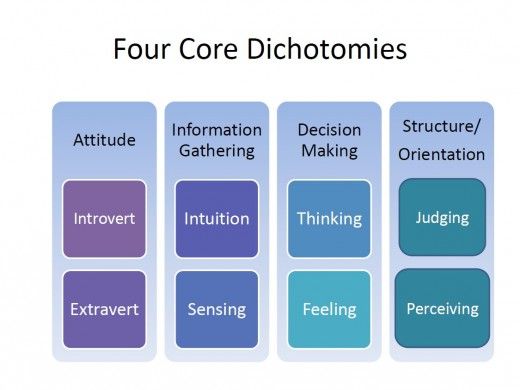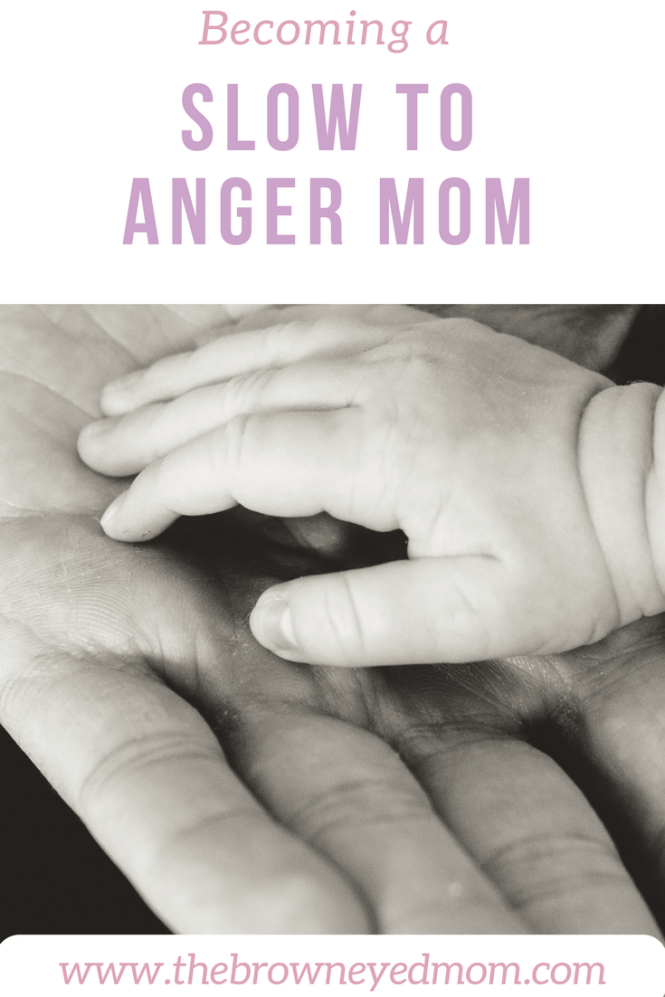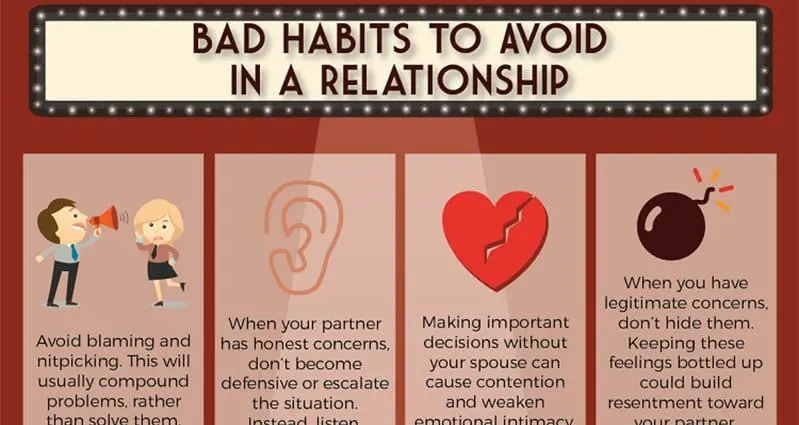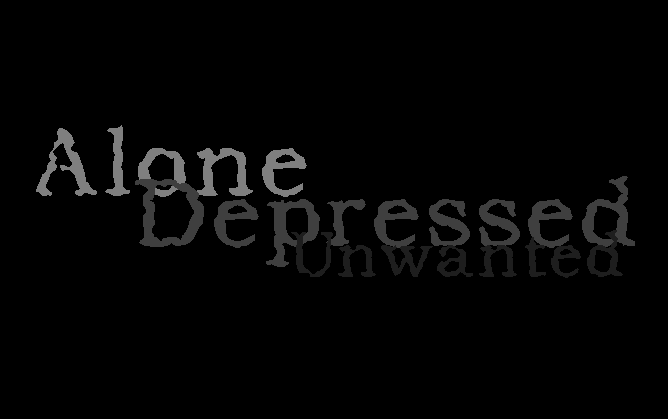Polyamorous monogamous relationships
Navigating Relationships When One Person Is Poly And The Other Is Mono
By Genevieve Fahey
Marriage and Family Therapist
in Sacramento
January 14, 2021
For many polyamorous identifying people being poly is an innate orientation, not a choice at all. They share that they feel they are wired that way. And, many monogamous people say they are, in kind, wired for monogamy. So, if being polyamorous or monogamous is an innately wired orientation how do we navigate a relationship where a polyamorously oriented person and a monogamously orientated person fall in love?
What is a “Mono/Poly” Relationship?
These kinds of relationships (in which a monogamous and polyamorous person fall in love) have been termed, “Mono/Poly Relationships.” And, we can look to the The Polyamorous Community for some guidance on the topic. They have had to think more about this issue than monogamous folks, typically, because monogamy is the norm in our society.
The Poly community is divided on how to approach Mono/Poly Relationships. Some say to just not get involved. They have horror stories about how it didn’t work out for them.
Their mono partner was too insecure, jealous, pressured them to be exclusive, or they just felt they were breaking that person’s heart every time they went on a date. Conversely, some people have absolute success stories. One partner may have come out as polyamorous after the relationship was already established, and the couple came to the conclusion that the poly person will have multiple relationships, while the mono person does not. And, this can work. In fact, it is a very common place to land for the Mono/Poly couple. Sometimes the mono partner does date, and the poly partner supports them in slowly exploring opening up. There are also cases where the poly partner decides it is right for them to engage in a monogamous relationship with this partner for a variety of valid reasons. There are all kinds of ways to negotiate Mono/Poly relationships. Each couple has to decide what is right for them.
Each couple has to decide what is right for them.
There are so many things to consider when entering into a Mono/Poly Relationship.
How To Handle It
Should the poly partner immediately start dating other partners or wait? One school of thought is that starting to date right away will get the mono partner acclimated to this new way of having a relationship. The conventional wisdom here is that it is easier to start a relationship open than to change the status quo later. The other school of thought is that you should hold off on beginning new relationships or dating until your mono partner is secure, and therefore your relationship is more established (this is, of course, assuming the poly partner does not already have other partners).
Should you give this relationship a try at all? Is this kind of relationship doomed? Some good advice for anyone who finds themselves in a Mono/Poly situation is that if you think the emotional labor is worth the relationship then put in the work, clearly communicate, and have empathy for your partner. Basically, good advice for any relationship. I don’t believe differing relationship orientations need to be non-starters for relationships. Mono/Poly Relationships can, not only be successful, but can also be very fulfilling. You need to decide if this kind of relationship is right for you, just as you would have to do with any other kind of relationship. If you decide that you are going to enter into a Mono/Poly relationship then it will be important to do some internal investigation of your own needs, feelings, and beliefs. Then, you should be ready to share these with your partner, and ready to do a lot of processing and continual check-ins with your partner.
Basically, good advice for any relationship. I don’t believe differing relationship orientations need to be non-starters for relationships. Mono/Poly Relationships can, not only be successful, but can also be very fulfilling. You need to decide if this kind of relationship is right for you, just as you would have to do with any other kind of relationship. If you decide that you are going to enter into a Mono/Poly relationship then it will be important to do some internal investigation of your own needs, feelings, and beliefs. Then, you should be ready to share these with your partner, and ready to do a lot of processing and continual check-ins with your partner.
Best First Steps
Identify Needs, Be Honest, and Open Conversation
Once you’ve identified your needs, and where you stand, you need to be very clear and honest with your partner about that. This conversation is potentially going to be painful and awkward, on both sides. Be clear with them that you are here for the conversation, for them, that nothing needs to be decided today, and that you are sharing about yourself and want to hear about them. Reassurance is key to setting this conversation up.
Reassurance is key to setting this conversation up.
Find Healthy Ways to Communicate
You are both going to need to hold space for the other’s strong emotions. This can be deeply uncomfortable. You may find yourself wanting to fix your partner’s feelings for them, bury your feelings just to keep the peace or use your strong emotions as a way to get your partner to adjust their behavior. These are normal impulses, but you can find healthier ways of communicating than to act on these impulses. One way to do this is to notice and name the impulses. Then you can follow it up with a need your partner can potentially and reasonably meet.
Take Your Time
It feels good when a loved one shows curiosity in us. Ask your partner what their orientation means to them and what assumptions they hold about yours. Listen as if you are trying to get a window into your partner’s world. Suspend judgment for now. If you are the poly partner, and you just came out to your monogamous partner, then they are likely going to want to know if this means you are planning a date with someone else for tonight, and how the heck they are going to handle that! And, have you already been seeing someone? Do you have someone in mind that you are bringing this up specifically for? Monogamous partners might have insecurities stemming from a culture that tells us love is about ‘the one and only. ’ As a poly partner, be prepared to patiently answer all your mono partner’s anxious questions, offer reassurance and set realistic expectations. Assure them that not all the big questions need to be answered right now. It is a good idea to sleep on the immense information you have both just
’ As a poly partner, be prepared to patiently answer all your mono partner’s anxious questions, offer reassurance and set realistic expectations. Assure them that not all the big questions need to be answered right now. It is a good idea to sleep on the immense information you have both just
shared before making concrete decisions. Ask them if this is something they think they can be open minded about. Assure them that this has nothing to do with them and that your feelings for them have not wavered.
Be Kind
Remember that you both did grow up in a monogamous culture. Some toxic monogamous messages may be embedded in your unconscious. Toxic stereotypes about polyamorous people sound like, “you’re selfish, why, you’re greedy, you’re a sexaholic or slut, etc.” These stereotypes are not true, and poly folks do not need to apologize for the way they are oriented. Just as we would not counsel a queer person to apologize for their sexual orientation. A poly partner’s need for other partners has nothing to do with their partners or any other human being.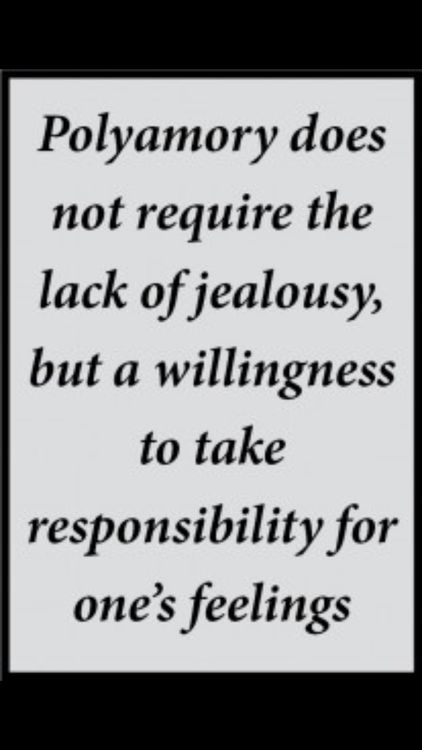 It is how they are wired. Being polyamorous is their personal identity, and has no moral value. It would not be okay for the monogamous partner to hurl any of these cruel stereotypes at their partner, no matter what they might be feeling.
It is how they are wired. Being polyamorous is their personal identity, and has no moral value. It would not be okay for the monogamous partner to hurl any of these cruel stereotypes at their partner, no matter what they might be feeling.
If you are the monogamous partner you may feel frozen or angry or incredibly heart-broken. You may be grieving the relationship you had fantasized having. These are all valid things to feel, but it also does not mean that your feelings reflect reality. You might feel abandoned, but you are not being abandoned. If your first reaction is really big then you may just ask to be held while you cry or you may want space. When you are ready, come back and ask any questions you have. At this time, it is probably best to keep the conversation open. You may want to refrain from saying things that put you at an impasse for now.
If you are the poly partner you may be feeling guilty, responsible for your partner’s hurt feelings, and wishing you could just ‘be like everyone else. ’ Remember, you are oriented this way and you have a right to be out and be yourself. You have done a brave thing by beginning this conversation. You may also need reassurance right now that you aren’t going to be abandoned because of who you are. If the relationship does end, it might feel like abandonment, but it isn’t about you. It is about you and your partner having differing needs. As painful as that is, it is no one’s fault.
’ Remember, you are oriented this way and you have a right to be out and be yourself. You have done a brave thing by beginning this conversation. You may also need reassurance right now that you aren’t going to be abandoned because of who you are. If the relationship does end, it might feel like abandonment, but it isn’t about you. It is about you and your partner having differing needs. As painful as that is, it is no one’s fault.
Keep Checking In
Now, that you’ve begun to talk about what this relationship will look like, it is time to keep talking. Continually having check-ins about if anything has changed on either end, what new things you have discovered about your relationship orientations, your sexual needs, your romantic and affection needs, your feelings about each other, what needs are being met and what needs are not being met, your fears and insecurities is paramount. And, uncomfortable! These conversations are all the stuff we usually want to avoid. But, it’s also the stuff that makes a relationship healthy. You might end up growing immensely as people and as a couple from this thing that felt like a crisis.
You might end up growing immensely as people and as a couple from this thing that felt like a crisis.
Make Plans Together
If you are moving towards openness, at least on one end, come up with a comfortable opening up plan together. Again, this has to be individual to what works for you. Do not agree to a relationship dynamic with the hope that your partner will dislike it and change. A conscious way forward has to be agreeable to both of you if the relationship is to have longevity or intimacy.
Most Importantly…
Do what you want for you and your relationship. Throw out the rule book. Don’t listen to society, cultural norms, religion, or your family of origin about what your relationship should look like. Make it up for yourself. Be a relationship anarchist.
If you’re interested in Genevieve’s blog posts, you can find more by checking out:
-
How I do (and don’t) Help People Coming Out as Polyamorous
-
Being Poly In A Mono World: A Paradigm Shift
About The Author
Genevieve Fahey is a Licensed Marriage and Family Therapist with a private practice in Midtown, Sacramento. She identifies as Queer herself, and is dedicated to providing informed therapeutic services to the under-served LGBTQQI and Poly communities. She loves working with people who are carving their own way in this world. She has 8 years of clinical experience with couples and individuals. She doesn’t work alone though. Her co-therapist is a lovable therapy-dog named Halo.
She identifies as Queer herself, and is dedicated to providing informed therapeutic services to the under-served LGBTQQI and Poly communities. She loves working with people who are carving their own way in this world. She has 8 years of clinical experience with couples and individuals. She doesn’t work alone though. Her co-therapist is a lovable therapy-dog named Halo.
She is currently offering therapy through telehealth and can be reached at [email protected]. You can also follow her for inspirational, uplifting quotes on Instagram @tellyourtherapist.
Related posts:
Mono-Poly Relationships in Therapy - The Affirmative Couch
Ask Us Anything:
How does a therapist deal with a couple where one partner prefers monogamy and the other wants to be polyamorous? First, we can consider the many ways in which one might ask this question, which can change its meaning. There are several situations when this will come up in the therapy room, and a therapist may help different couples navigate this in various ways. I prefer to say “work with” rather than “deal with,” due to the negative connotation of the latter.
I prefer to say “work with” rather than “deal with,” due to the negative connotation of the latter.
- How does a therapist work with a couple in which one partner is monogamous while the other is polyamorous and wants to open up the relationship?
- How does a therapist work with a couple in which one partner is polyamorous while the other is monogamous and wants to close their relationship?
- How does a therapist work with a couple in which one partner is just realizing they are or is coming out as polyamorous?
These are similar questions, but address slightly different concerns. One involves the possibility of opening up the relationship; another involves the possibility of closing the relationship; and the last may have several different implications for the relationship.
Couples’ Histories and PresentationsMono-poly relationships are possible and can be fulfilling, but each couple may come to different conclusions about how they want to go about this kind of relationship. It is important to note that the way a therapist can help couples to navigate their relationship depends largely on how the couple presents, as well as their history together.
It is important to note that the way a therapist can help couples to navigate their relationship depends largely on how the couple presents, as well as their history together.
For example, consider a couple that has been married and monogamous for 17 years. One partner started saying that they are polyamorous only after their partner found out about an affair. Their situation is markedly different from that of a couple featuring one partner who was polyamorous when the relationship began while the other partner was monogamous. The couple finds that this is coming up as an issue in their relationship a few years later.
These two cases also contrast greatly from a couple in which one person learned about polyamory and brought it up to their monogamous partner. This couple ends up in your office as they attempt to navigate their differing needs in the relationship.
Therefore, it is essential for a therapist to first gather a history of the clients and how their relationship is currently functioning, as well as to learn whether they have had past issues with trust or commitment.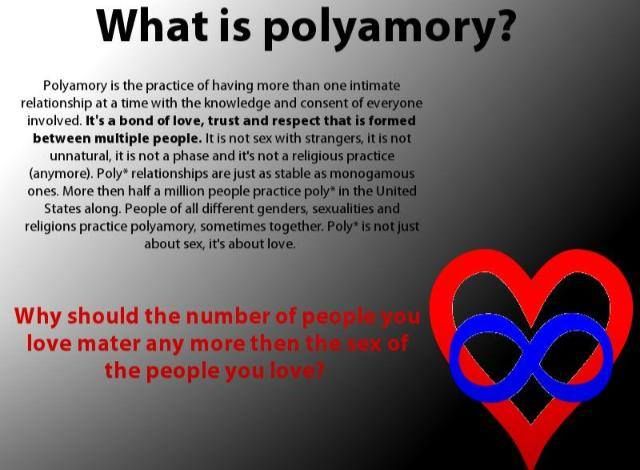 Some individuals do come to therapy with the belief that polyamory will “fix” their relationship. It’s worth noting that in many cases, polyamory can help one or both partners feel more fulfilled and less pressured, but in other cases, the relationship should be strengthened before anyone tries to open it up–if the couple does indeed want to stay together.
Some individuals do come to therapy with the belief that polyamory will “fix” their relationship. It’s worth noting that in many cases, polyamory can help one or both partners feel more fulfilled and less pressured, but in other cases, the relationship should be strengthened before anyone tries to open it up–if the couple does indeed want to stay together.
The history that the therapist gathers should include questions like, “Have you discussed your relationship agreements in the past? What are they and what have they been? Were your relationship agreements openly verbalized, or were they assumed? How, if at all, have you negotiated your current relationship agreements? What does monogamy/polyamory mean to you?” All of these questions will offer valuable insight into what each partner is seeking, each person’s understanding of the relationship as it stands, and where they may be able to find common ground.
The initial agreements that the couple had at the beginning, or for the majority, of their relationship are very important here.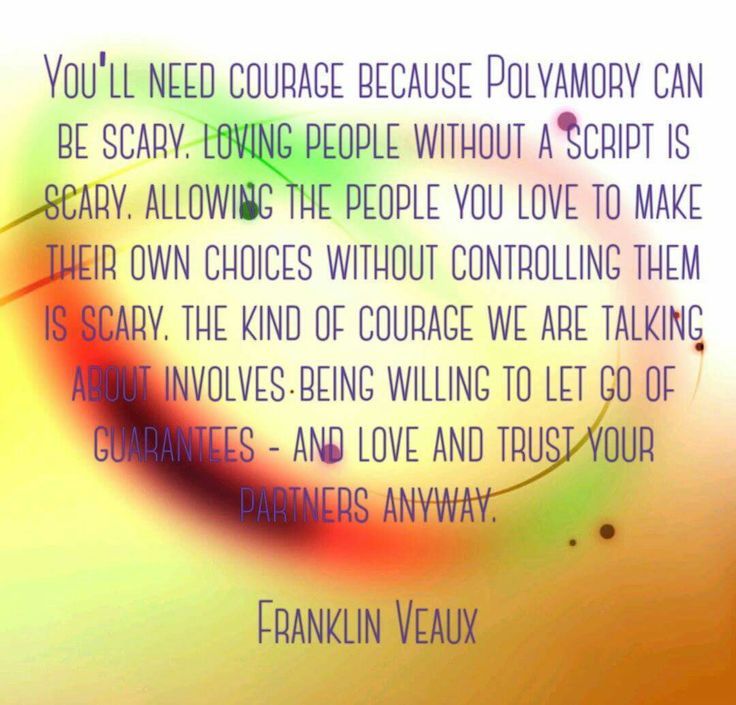 Deciding whether to open a relationship may share some parallels with deciding whether or not to have a child. Having a child is a life-altering decision, and there is nothing “right” or “wrong” about wanting or not wanting children. However, if both partners had an understanding that they were on the same page for years, and now one person has changed their mind about wanting children, this can be an insurmountable difference in what they want, and how or whether the partners can move forward with their relationship.
Deciding whether to open a relationship may share some parallels with deciding whether or not to have a child. Having a child is a life-altering decision, and there is nothing “right” or “wrong” about wanting or not wanting children. However, if both partners had an understanding that they were on the same page for years, and now one person has changed their mind about wanting children, this can be an insurmountable difference in what they want, and how or whether the partners can move forward with their relationship.
Likewise, adding a new partner separate from the initial couples relationship will always change the dynamics of the first relationship–just as having a baby will change the dynamics between a couple who are new parents. This is not a bad thing! But it is something that all partners should be aware of. Often, the person who wants to change the initial agreements of the relationship will have to realize that this is what they are doing or requesting, and must be patient while their partner catches up or decides whether this is something they are able and willing to change for themselves as well.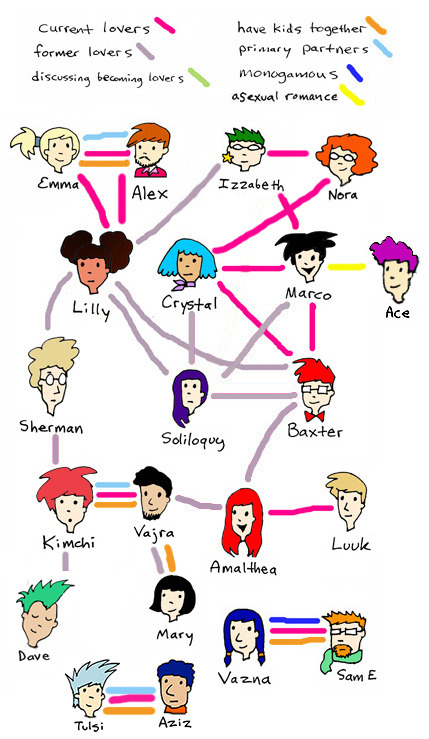
So, what does each partner in the relationship want? Sometimes clients will want their partners to share the same relationship behaviors and identities they have. What this means is that someone monogamous may want only one partner, and expect the same of their partner. Or a polyamorous person may have the expectation that their partner will also want multiple romantic or sexual partners.
This is where couples therapy can get complex. If one partner has a monogamous relationship orientation but is comfortable with their partner maintaining other romantic or sexual involvements, there can be room for flexibility within the relationship. Likewise, if one partner has a polyamorous relationship orientation, but doesn’t care whether their partner has multiple partners of their own, there is flexibility here as well. Mono-poly relationships can work well as long as there is flexibility within the relationship and an understanding of one another’s relationship orientations and identity.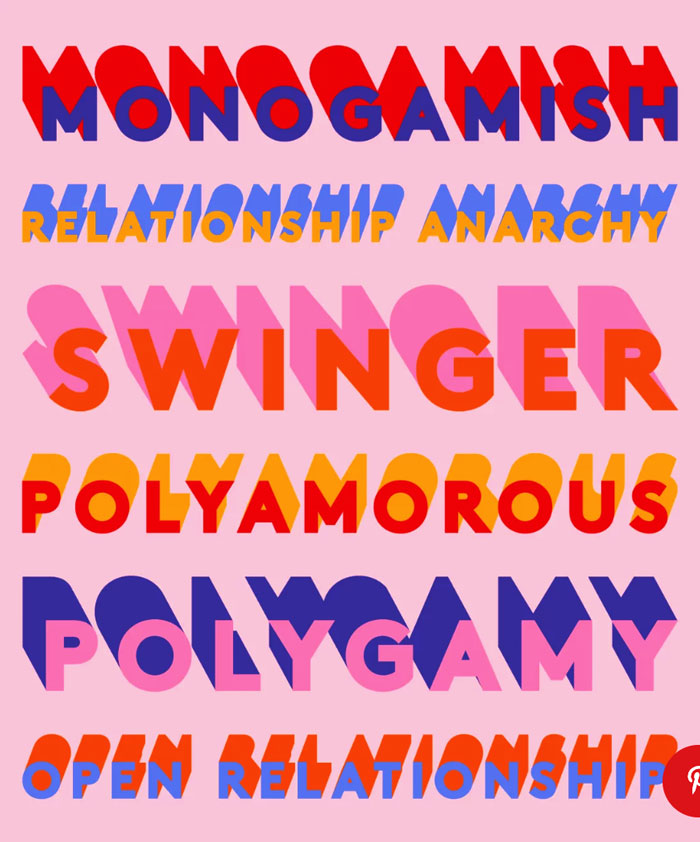
With this in mind, there are a few things to explore for a relationship in which one partner wants to open up:
- Would the monogamous partner be open to having their partner dating other people?
- If not, do they cite jealousy as the reason for not wanting to open up, without much analysis behind this? Exploring the jealousy and what is underneath may be helpful. The intention here cannot be to remove the jealousy in order to help the relationship become polyamorous, but to address jealousy simply because it is healthy for the relationship.
- If they are open to the idea, under what circumstances? What needs would have to be met to ensure that the partner continues to feel special and loved?
- Was this a shift in the relationship?
- Did the couple first get together when both of them were single, and have they been monogamous with each other so far? Is the conversation now about opening up the relationship, even though the polyamorous partner had been open about their orientation from the outset?
- In this circumstance, the monogamous partner may have had fantasies that they could change their polyamorous partner, which may cause significant resentment.

- In this circumstance, the monogamous partner may have had fantasies that they could change their polyamorous partner, which may cause significant resentment.
- Or had the relationship started monogamously, and now the polyamorous person is coming out or talking about an interest in dating other people?
- In this circumstance, the monogamous partner may have been taken aback by this interest, and it may trigger some insecurities about themself or the quality of their relationship.
- Did the couple first get together when both of them were single, and have they been monogamous with each other so far? Is the conversation now about opening up the relationship, even though the polyamorous partner had been open about their orientation from the outset?
- Is there a control issue at play? The person who says ‘no’ to a request has the power in the relationship. Is there anything like this going on in the relationship that needs to be addressed?
- Does one partner feel judged for their monogamy? Sometimes polyamorous folx can assert that their relationship orientation is “better” and “more evolved,” and that the monogamous partner should shift their heteronormative, monocentric, patriarchal views of relationships and therefore open the relationship. This would be coercive and should be addressed directly in therapy.
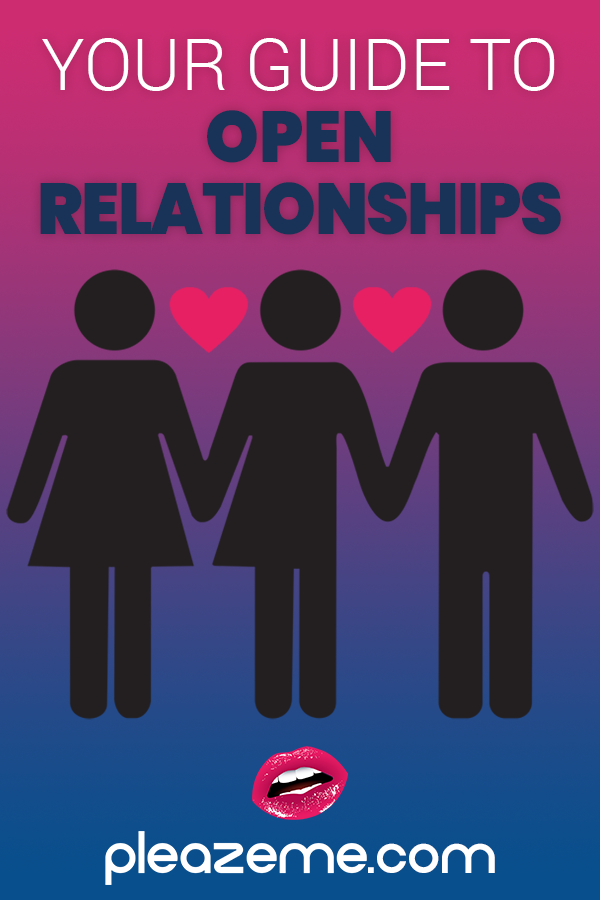
- Does one partner feel judged for their polyamory? Sometimes monogamous folx can assert that their relationship orientation is “better” and “more secure” and that the polyamorous partner is being greedy or slutty, or is harming the relationship or their family and should therefore be monogamous. This would be coercive and should be addressed directly in therapy.
Ultimately, there is a lot to explore when a couple is presenting as mono-poly, and there are many different directions that couples therapy could take. Couples therapists may find that it can be most helpful to assess whether the couple has a secure attachment to one another, or if they are relying on the structure of their relationship to either feel secure or to try to create distance.
In addition, it is also helpful to remember that the goal of couples therapy is not necessarily to keep couples together. The goal of couples therapy is for each partner to increase understanding about themselves and each other; increase understanding about the relationship between the partners; and to create the love and connection(s) that each partner wants. Sometimes, this means that the couple will not stay together. And that’s okay.
Sometimes, this means that the couple will not stay together. And that’s okay.
References
Benoit, S. (2019, April 11). This is What Couples Therapy Can Actually Solve. GQ. https://www.gq.com/story/couples-therapy-guide
Conner, S. (2020, February 24). Helping Clients to Negotiate Intimate Relationship Contracts. The Affirmative Couch. https://affirmativecouch.com/helping-clients-to-negotiate-intimate-relationship-contracts/
Hope, R. (2019, November 5). Exploring Mono-Poly Relationships. Polyamory Today. https://medium.com/polyamory-today/exploring-mono-poly-relationships-ae5e78bef452#:~:text=A%20mono%2Dpoly%20relationship%20is,other%20partner%20identifies%20as%20monogamous.&text=Relationships%20between%20two%20polyamorous%20people,of%20relationship%20is%20no%20different.
Sullivan, S. (2019, June 14). Managing Jealousy in a Polyamorous Relationship. The Affirmative Couch. https://affirmativecouch.com/managing-jealousy-in-a-polyamorous-relationship/
What is polyamory: pros and cons, difference from polygamy
- What is polyamory
- What is the difference between polyamory and polygamy
- Why people choose polyamory
- For and against polyamory
- Polyamory in Russia and in the world
- Expert comments
What is polyamory
Polyamory, or ethical non-monogamy - the presence of several partners and intimate relationships. They can be both sexual and platonic, but always with the full consent of all parties, regardless of gender.
They can be both sexual and platonic, but always with the full consent of all parties, regardless of gender.
Advertising on RBC www.adv.rbc.ru
One in five Americans have been in a non-monogamous relationship in the past, and about one in 20 admits to one today. Studies show that partners in such relationships are happy on a par with married monogamous people [1]. Polyamorous relationships require openness, trust, the consent of all participants, as well as good communication skills, clear boundaries and mutual respect. Polyamory is different from other forms of open relationships, such as swing, which are predominantly sexual relationships involving other people or couples without emotional attachment.
Polyamory is not legally recognized as a form of sexual orientation. But this question remains the subject of much controversy among sexologists and "practicing" polyamorists. Many people in non-monogamous consensual relationships believe that this is their orientation.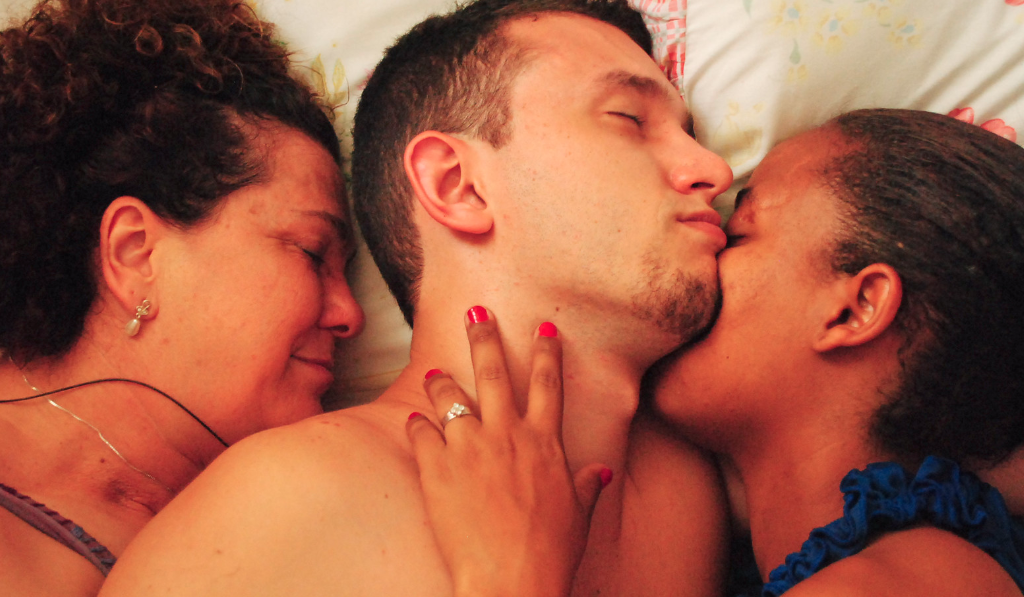 They tried to find satisfaction in a monogamous relationship, but failed. The term "polyamorous relationship" is still positioned as a personal choice or lifestyle.
They tried to find satisfaction in a monogamous relationship, but failed. The term "polyamorous relationship" is still positioned as a personal choice or lifestyle.
© Cottonbro/pexels
What is the difference between polyamory and polygamy
Polyamory is often confused with polygamy or marriage to more than one person at the same time, but they are different concepts. Polygamy involves marriage to several people of the opposite sex - most often a man with several wives. Polyamory, while including married partners, describes a wider range of relationships, both heterosexual and LGBTQ+.
Non-monogamy can be different. Sexual relationships range from polyamory to polygamy. Other arrangements may include polyverity, a closed relationship that involves sexual and emotional commitment to a group of more than two people, and relationship anarchy, a format in which there is no hierarchy and, accordingly, there is no division of partners into "main" and "additional".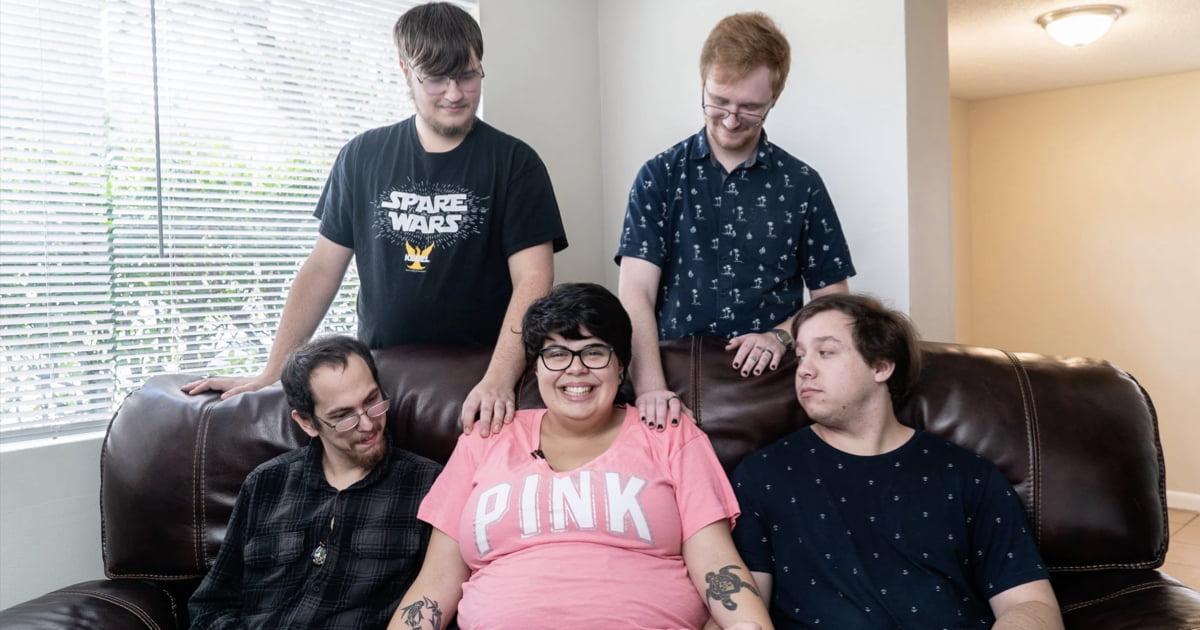
Why people choose polyamory
As a rule, partners consciously choose polyamory because they see it as an opportunity to deepen their connection with each other. Many people think that polyamory is cheating. But this is a common misconception. Cheating is deceit and betrayal, for example, if you and your partner agree not to have sex with other people, but one of you breaks this promise. The difference between cheating and polyamory is that in the latter case, partners agree to be in relationships with other people.
Some polyamorous advocates see the value of the classic two-partner relationship as obsolete and rethink stereotypes about sex and romance.
“In my close circle, polyamory is the norm, and monogamy is the exception,” says Alexander, a fashion designer in a polyamorous relationship. - As a teenager, I fell in love with everyone, and the stereotype prevented me that you need to love someone alone. From the age of 18, I was in several parallel relationships at once, and this is not about one-time sex, but about an emotional connection as well. I have been married for 20 years and my wife is the best woman in the world. In the beginning, we considered ourselves monogamous. But the need for other people remained, and it was not clear how to talk about it. Later came to polyamory. We discussed issues of jealousy, betrayal, and it turned out that nothing prevents us from enjoying the company of other people. I think in terms of aesthetic experiences. It happens that a casual connection at a party develops into a wonderful spiritual contact that is not disturbed by distance. So, we meet with N in different countries, we do joint projects. For me, a relationship that lacks a sexual aspect is inferior, and a person with whom an intimate relationship is associated is easier to trust.
I have been married for 20 years and my wife is the best woman in the world. In the beginning, we considered ourselves monogamous. But the need for other people remained, and it was not clear how to talk about it. Later came to polyamory. We discussed issues of jealousy, betrayal, and it turned out that nothing prevents us from enjoying the company of other people. I think in terms of aesthetic experiences. It happens that a casual connection at a party develops into a wonderful spiritual contact that is not disturbed by distance. So, we meet with N in different countries, we do joint projects. For me, a relationship that lacks a sexual aspect is inferior, and a person with whom an intimate relationship is associated is easier to trust.
There is no standard test for polyamory tendencies. Relationships exist in order to be happy in them. Therefore, to the question “Is polyamory right for you?” the answer will be extremely simple. It is only important to decide how comfortable it is to let several people into your life and share partners with others.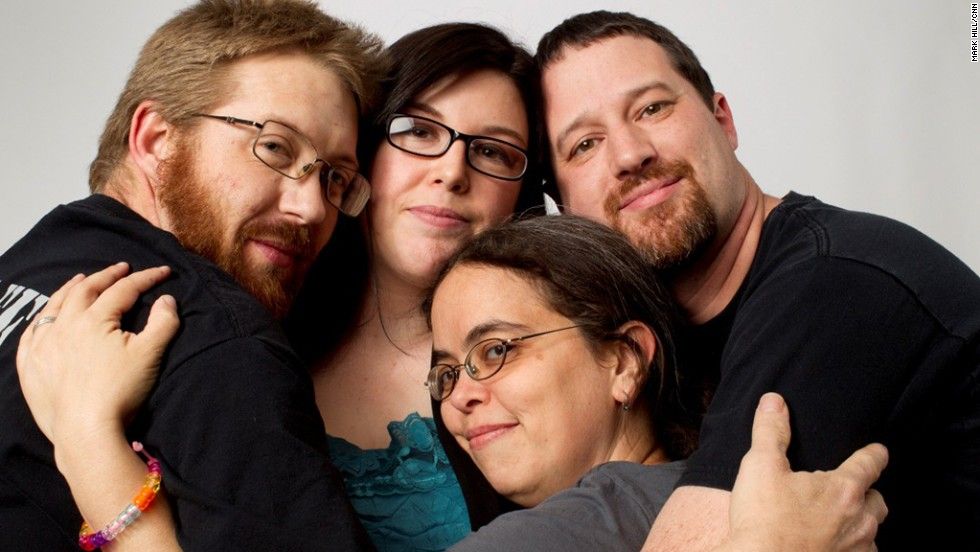
© Rene Ranisch/Unsplash
Pros and cons of polyamory
Any relationship can be destroyed by jealousy and arguments about raising children, warns Alena Golzitskaya, systemic family psychotherapist, researcher at the Psychological Institute of the Russian Academy of Education. In polyamorous unions, these aspects are complicated by the number of participants. Polyamory can be kept secret from close friends and family. According to the non-profit organization Loving More, at least one in four polyamorous people have been discriminated against.
Among the arguments in favor are the following:
- A polyamorous relationship in which all participants know about each other, voluntarily accept this fact and try to take care of the interests of partners and their feelings, may seem to be the most humane option, where there is no place for betrayal and possible harm caused to the psyche of each of the participants.
- Among the positive aspects, one can highlight the potential for a deeper understanding and elaboration of relations as such, a careful attitude towards partners, more time spent on establishing and maintaining a quality connection.
 It is impossible to be in a long-term polyamorous relationship and not strive to better understand all the participants, their motivation.
It is impossible to be in a long-term polyamorous relationship and not strive to better understand all the participants, their motivation. - The most intriguing of the arguments for is the experience of living an emotional and intimate connection with several partners at once, without the burden of guilt and fear of being discovered, without clarifying the relationship and causing pain to those you love. If in polyamorous unions it is possible to build a balanced interaction in which everyone feels comfortable, then the bonuses from such communication can more than exceed the resources spent.
At the same time, the very theoretical model of polyamory — everyone accepts everyone, approves and enjoys loving everyone they like — in practice, it often encounters a harsh reality. Some people are accustomed to wanting the exclusivity of a relationship, especially when falling in love with a partner is great and completely captures. Then any applicant for his attention is perceived as a threat, which gives rise to anger, jealousy and leads to suffering. Thus, it can be difficult to achieve a balance in a relationship when the new person is perceived not as a potential breaker, but as someone who is important to the partner and deserves respect.
Thus, it can be difficult to achieve a balance in a relationship when the new person is perceived not as a potential breaker, but as someone who is important to the partner and deserves respect.
© Katerina Holmes/Pexels
Another challenge is making the decision to reformat the relationship. It happens that one in a couple is ready to go for this experiment, while the second is forced to agree, realizing that if he refuses, he will be left or deceived. Under such conditions, it is almost impossible to talk about the free choice of this form of relationship.
And you also need to understand that with the increase in the number of partners, the amount of attention and investment that is required to be done in order to satisfy their relationship needs inevitably increases. Thus, one must be prepared to master the skills of organizing interaction in which no one will be deprived, otherwise a collision with resentment, envy and anger of one of the partners is inevitable, which does not strengthen the union.
Polyamory in Russia and around the world
To collect statistics, sociologists conduct surveys among respondents from polyamorous websites and send out questionnaires. It should be borne in mind that among the participants there may be simply interested people and those who do not intend to move away from monogamy. In October 2015, 5043 people aged 13–55 were interviewed [2]. The status of the respondents was assessed using the question “Do you consider yourself polyamorous?”. Answer options were offered:
- no, and I never would;
- no, but was before;
- no, but would like to;
- yes.
The study showed that 59.8% of those surveyed consider themselves monogamous, 25.5% would like to try a polyamorous relationship, 7.6% indicated that they were in a relationship in the past, and 7.1% are polyamorous. The number of people from the latter group was higher than the researchers expected. They attribute the high rate to sample bias.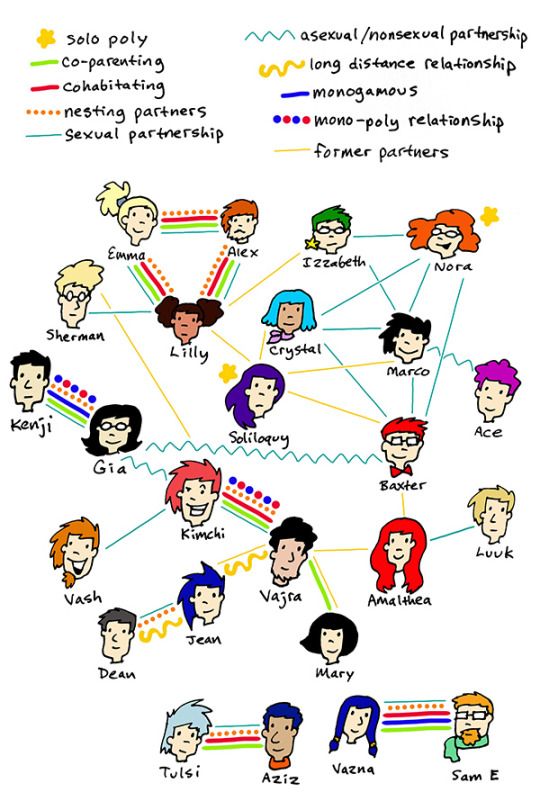 It included social media users who take online personality tests. Often these are young, liberal, atheistic and non-heterosexual people.
It included social media users who take online personality tests. Often these are young, liberal, atheistic and non-heterosexual people.
© openpsychometrics.org
In terms of gender, there are more polyamorous men among men, while women tend to be monogamous in the majority.
© openpsychometrics.org
Age doesn't really change how you think about relationships with multiple partners. After the age of 33, theoretical interest in them decreases against the background of a larger number of both monogamous and polyamorous respondents.
© openpsychometrics.org
In 2015, the poll was also conducted by the American Institute of Public Opinion Gallup [3]. According to the results of the research, it turned out that the number of people choosing polygamy has almost doubled compared to 2001.
Expert comments
Alena Golzitskaya, systemic family psychotherapist, researcher at the Psychological Institute of the Russian Academy of Education
So far, in Russia (as, I believe, in the entire Western world), polyamory is treated with caution.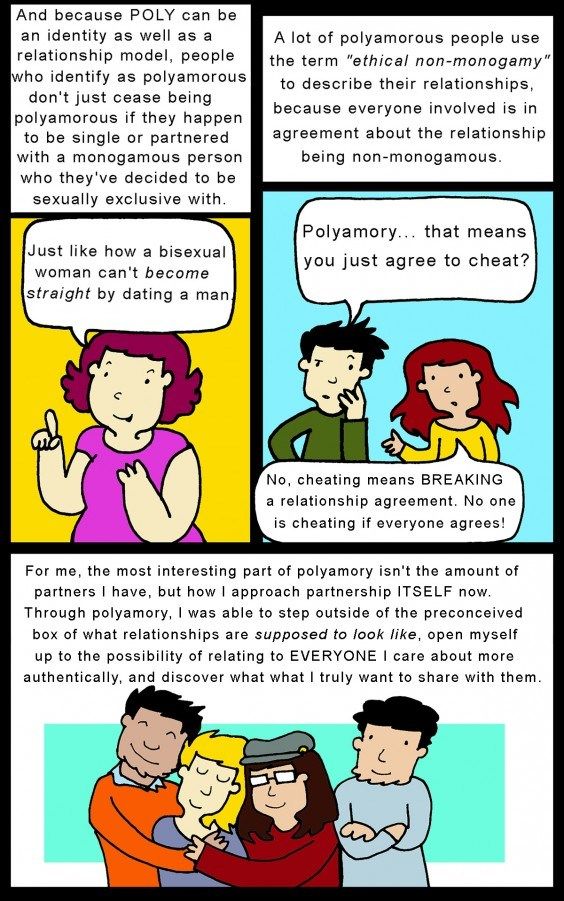 There are no official statistics for our country, and there won't be for a long time. Still, it takes time to introduce something new into such a highly regulated sphere of life as marriage or a romantic partnership.
There are no official statistics for our country, and there won't be for a long time. Still, it takes time to introduce something new into such a highly regulated sphere of life as marriage or a romantic partnership.
Apparently, the choice of polyamory is due to the fact that the usual forms of organizing relationships are no longer satisfying. An increase in life expectancy, the emergence of the opportunity to have several relationships, and not just one, orientation to one's own interests and needs - all this leads to the fact that a person is trying to figure out how to arrange the intimate part of his life in a more acceptable way than just entering into secret relationships .
Polyamory may be an attempt to revise the rigid norms of public morality, dictating that only the relationship of two people can be considered as falling under the category of marital or love.
The question "How to come to terms with a partner's polyamory?" wrong. Only a union of several people formed on a voluntary basis can be polyamorous, but if one of the participants must accept such a fate, this is no longer a polyamorous union, but abuse. Not always in polyamorous unions, all participants have sexual relations with each other. So, for example, in the union of one woman and two men, the latter may not have any physical relationship with each other. And in general, this is what polyamory and a voluntary form of interaction are for, so that no one is forced to do something that he is not ready to do or does not want to do.
Not always in polyamorous unions, all participants have sexual relations with each other. So, for example, in the union of one woman and two men, the latter may not have any physical relationship with each other. And in general, this is what polyamory and a voluntary form of interaction are for, so that no one is forced to do something that he is not ready to do or does not want to do.
Arina Vintovkina, sexologist, psychologist, journalist, author of the @vintovkina_arina blogs and telegram channel “This is normal”, married, has been in a polyamorous relationship for four years of 12 years of marriage
I am for kindness and awareness, against hypocrisy, gender stereotypes, hetero- and monocentrism. Analyzing my relationships and polyunions of friends, I can say that the only common denominator for adequate polyamory is the absence of initially unsuccessful starting conditions. For example, when people think about polyamory when they find themselves in a crisis situation, and hope to “fix” the relationship in this way.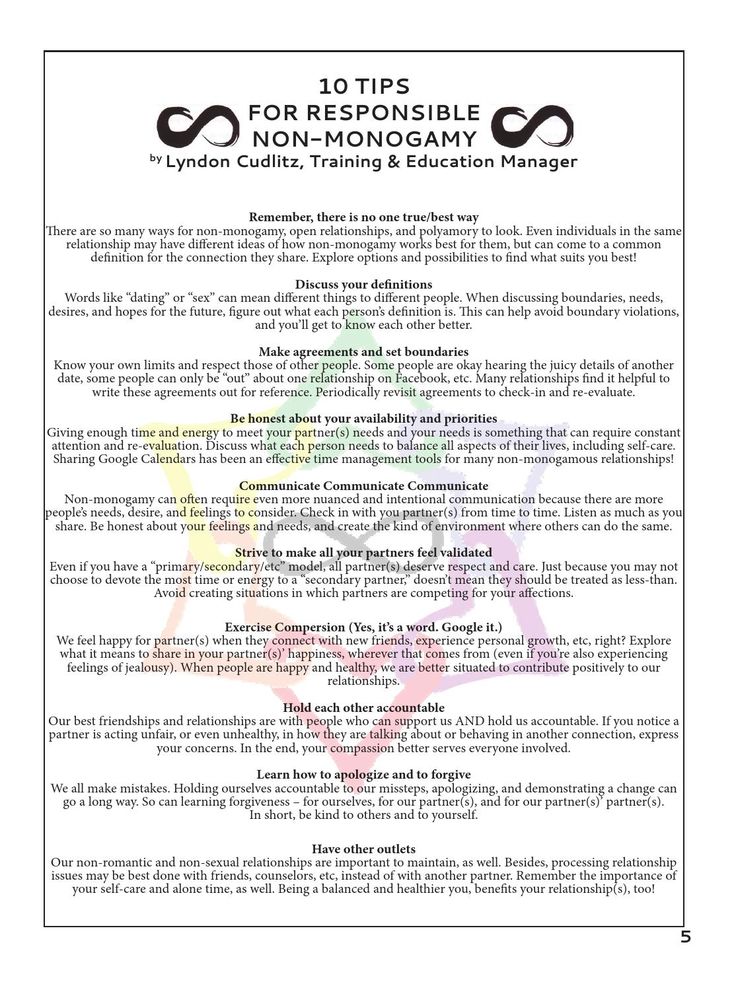 Before going polyamorous, my husband and I were monogamish for several years. The difference between this term and classical monogamy is that we had more sexual freedom, but the relationship was not completely open. At the same time, sex-positive thinking and mutual trust were always present. When a person appeared in my life, to whom something inside me responded and flared up, I immediately informed my husband about it. I wanted to share the joy with a loved one.
Before going polyamorous, my husband and I were monogamish for several years. The difference between this term and classical monogamy is that we had more sexual freedom, but the relationship was not completely open. At the same time, sex-positive thinking and mutual trust were always present. When a person appeared in my life, to whom something inside me responded and flared up, I immediately informed my husband about it. I wanted to share the joy with a loved one.
Our main principle in polyamorous relationships has been and remains unchanged: first we discuss the next step, then we take it.
Being openly polyamorous means often repulsing attacks and making excuses. I am calm about any private opinion, when it is expressed without obvious hostility. In recent years, I have been called both a narcissist and a person with a mental disorder, reproached for childhood trauma and problems with self-esteem. I can say one thing: by itself, the format of relationships, whatever it may be, does not say anything about human problems or pathologies of the psyche, it is a matter of motivation in each specific case.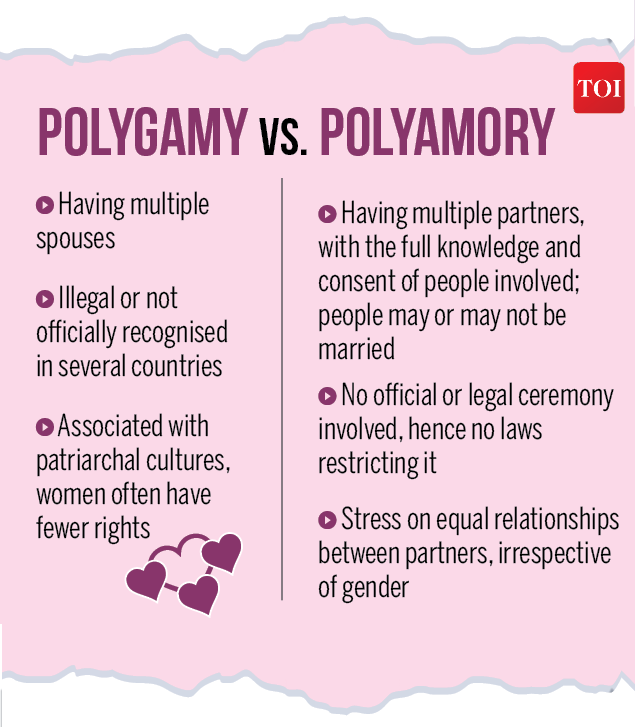 And it is impossible to determine it from the threshold if you are not a psychic. There is very little research on polyamory. But those that are, objectively show that there are no differences in personality tests, regardless of the number of partners. Polyamorous people are no more neurotic or immature.
And it is impossible to determine it from the threshold if you are not a psychic. There is very little research on polyamory. But those that are, objectively show that there are no differences in personality tests, regardless of the number of partners. Polyamorous people are no more neurotic or immature.
For example, there was a 1986 comparative study on the inability to be in a long-term relationship with 80 couples. Some of them were monogamous, others preferred an open relationship. Five years later, both of them had approximately the same statistics on parting - about 20%.
Polyamory has not made me less jealous than I was, say, ten years ago. The only thing that has changed is that I have learned to live with jealousy. My husband also believes that marriage is not a purchase, but an agreement and the best relationship is possible only for love, without trying to protect a partner from what brings him joy. Under what conditions is a loved one allowed to do what he wants? On the condition that he be happy.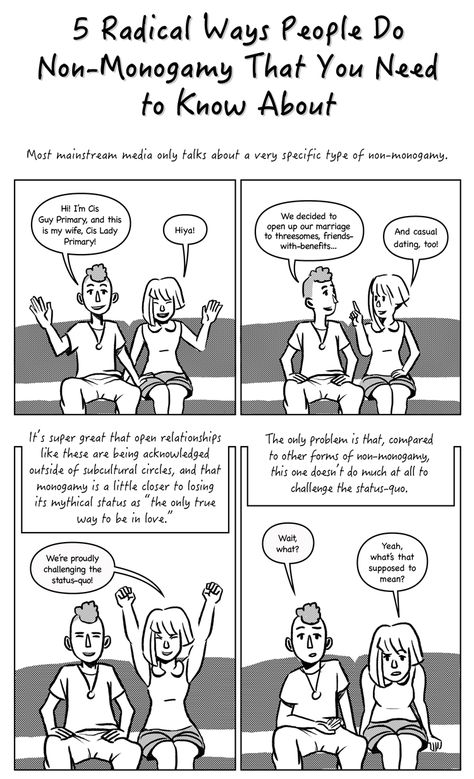 And love is always about acceptance.
And love is always about acceptance.
Tags: Relationships
Polygamous What is the difference between polyamory and polygamy and why there are more "open" couples? According to Mac, such connections have great prospects: they are becoming more and more popular. "Lenta.ru" understands the intricacies of communication and studies the issue using examples from the life of fans of free love.
Polyamory as a system of views approves the love relationships of partners with other people and encourages not to pay attention to the gender of the partner, that is, it welcomes non-traditional relationships. At the same time, polyamory and polygamy are close, but not identical concepts: the first focuses on love, the second on the family format. Polyamory is more of an outlook on life than a way of life.
Supporters of polyamory believe that not everyone can maintain monogamy, that freedom in choosing a life partner or partners is necessary. Two important conditions for such communication are the voluntary consent of all parties and absolute honesty.
The desire to have several love partners is considered absolutely natural. At the same time, all relationships that support polygamous people should be based on trust and respect, excluding the emergence of conflicts on the basis of jealousy, lies or betrayal.
Almost polygamy
Precise definition of polyamory itself and its criteria is impossible - everyone interprets it in their own way.
As a polyamorous relationship develops and new members are included, the format of communication can change from free to serious and vice versa. All parties that are in contact with each other should be able to speak openly and honestly among themselves.
One for all
On March 16, 2016 News.com.au published an article about Josh from South Carolina.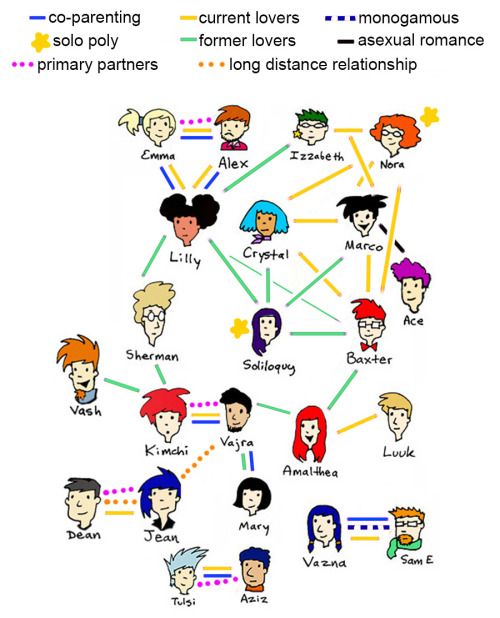 The American attracted the attention of journalists with an unusual way of life: he has three girls at once, with whom he is in an open polyamorous relationship.
The American attracted the attention of journalists with an unusual way of life: he has three girls at once, with whom he is in an open polyamorous relationship.
Sarah, Alyssia and Mary-Ashley say that this way of life suits them perfectly.
Photo: OpenMinded.com
It all started when Josh and Sarah met Alyssia, a bisexual who moved in with them. After some time, Mary Ashley joined the three lovers, which, as it turned out, rallied the group even more.
Each of the lovers brings something new to the common life without losing their own individuality. According to the only man, he would have lived quietly without a relationship if each of them would not have been so "incredibly happy." "It's our choice," Josh concluded.
Fours claim that they never have problems because of jealousy. “Demanding everything from one person is just not fair,” added Josh, who believes that monogamous relationships put too much pressure on a person.
Family Modernization
OpenMinded. com creator Brandon Wade called polyamory a form of “moral infidelity”: “Society has come to the conclusion that modern marriages no longer meet the needs of people and need to be modified. The "male-female" format is no longer satisfactory. Members of an open relationship are unconcerned freaks. These are successful, self-confident people, young professionals who do not take monogamy as a standard.”
com creator Brandon Wade called polyamory a form of “moral infidelity”: “Society has come to the conclusion that modern marriages no longer meet the needs of people and need to be modified. The "male-female" format is no longer satisfactory. Members of an open relationship are unconcerned freaks. These are successful, self-confident people, young professionals who do not take monogamy as a standard.”
Photo: Fred Prouser / Reuters
What it is
In March 2016, a 34-year-old woman who took the pseudonym Lisa told her story of polyamorous relationships to Elle. The heroine of the material has four lovers, including her civil husband. The husband is also dating two of his wife's partners.
“I grew up in a large family, and I always lacked the attention of others. Perhaps this is my way of getting it. I want to give love, which is very much in my heart. Sometimes I just go crazy in love with someone. Polyamory allows me not to throw off all this endless tenderness on my husband, ”Lisa explained her addictions.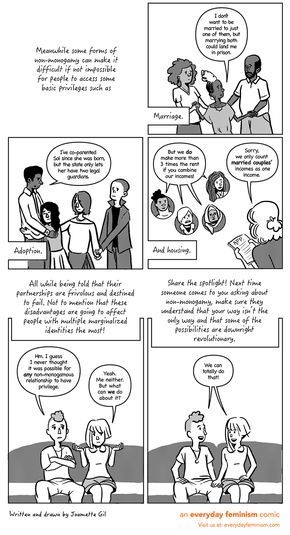
Everything changes
“After we got married, I couldn't believe I wouldn't have my first kiss again. It made me incredibly upset, ”recalls Lisa.
For the first time, the couple raised the issue of monogamy and their attitude towards it at the age of 18, when they had just moved in together. And both came to the conclusion that for them it is too much and even impossible. Since then, the couple periodically invited other people into their relationship, but this was not enough. After several years of living together, the couple completely abandoned the conventions and patterns by which they were originally going to build their marriage.
“Thanks to such relationships, it is possible to overcome the feeling of jealousy. You can talk openly about your feelings and freely make plans for the future, ”the woman explains.
Liza's husband also has a woman out of wedlock. Both women understand how they complement each other, and interact perfectly with each other.
Goes to the masses
The American Institute of Public Opinion Gallup conducted a study, the results of which showed that, compared with 2001, in 2015 the number of citizens accepting polygamous relationships more than doubled.
Photo: gaelx / Flickr
In 2009, Newsweek published statistics showing that more than 500,000 American families are in open polygamous relationships.
“Our system is completely focused on the nuclear family model with two biological parents. Many polyamorous families do not come out to neighbors or staff at their children's school. They are afraid that they will not be understood or judged,” Sandra Peace, a psychologist from California, comments on the situation to Mac. She has worked a lot with people who are part of the polyamorous community.
She also notes legal grounds for preventing polyamorous partners from being open about their relationships. According to Peace, this complicates divorce proceedings, establishing custody of common children, and creates other problems.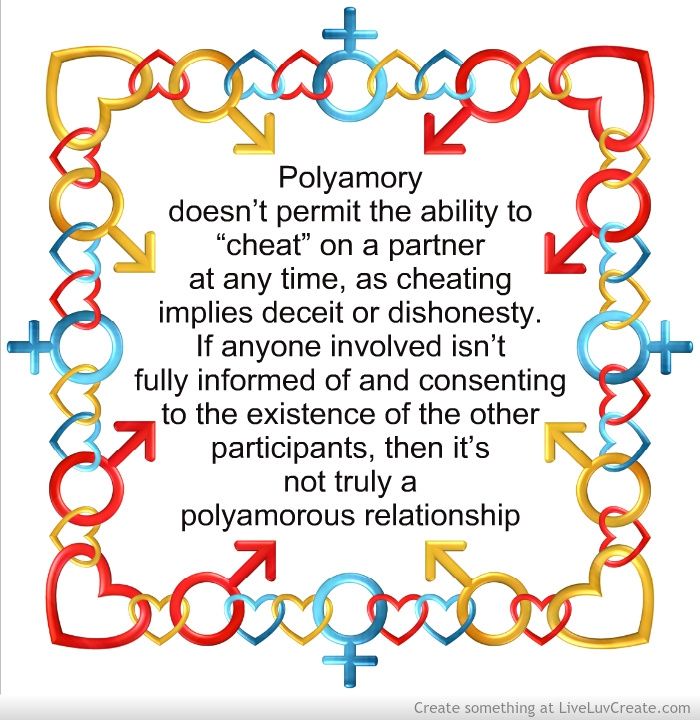
Voice of Reason
In 2000, one of the most high-profile court cases took place about the impact of a polyamorous family on a child. April Divibiss, a contestant on the MTV show, was deprived of custody of her own child due to the fact that she was in a polyamorous relationship.
The TV star's mother filed a lawsuit alleging that her granddaughter Alana was growing up in inappropriate conditions (April lived with two men). As a result of a two-year struggle, the girl was given to be raised by her grandmother, recognizing that she was able to create better conditions for her granddaughter.
What to be afraid of
“The possibility of child welfare services to remove them from polyamorous families is deeply embedded in the minds of any parent who shares our views. Vindictive exes, misunderstood relatives or neighbors - they can all pose a great danger and at one point destroy the family with some kind of harmful message, ”Pis explained the impact of the Divibiss case on the polyamorous community.
